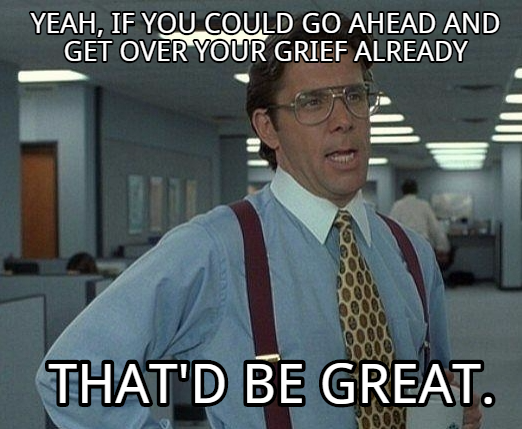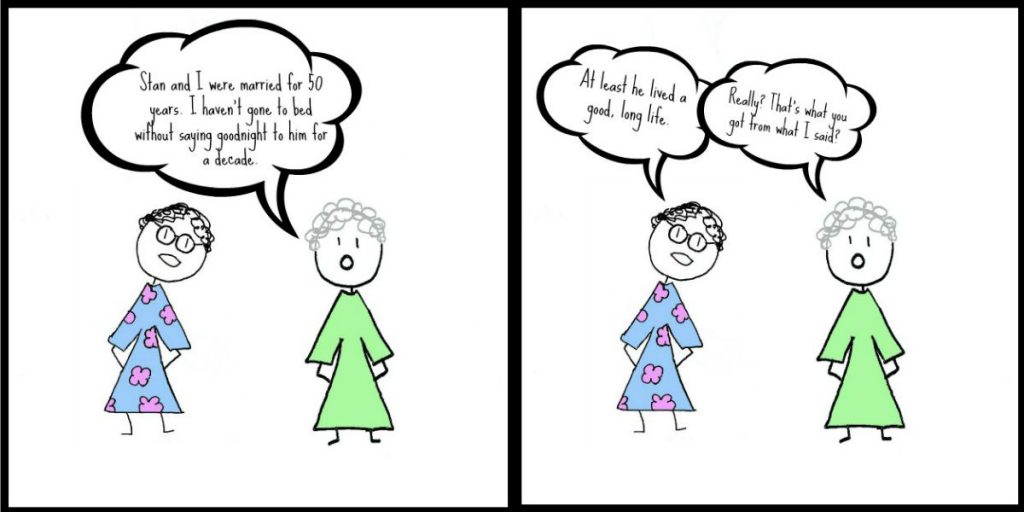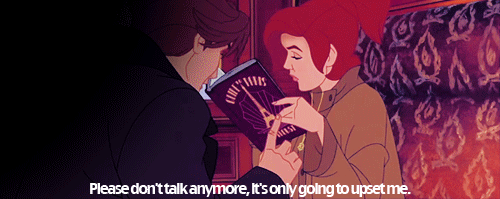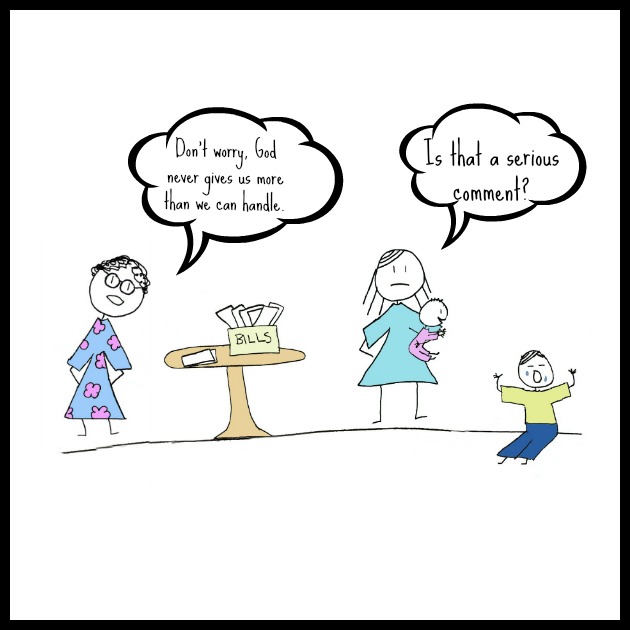64 Myths About Grief That Just Need to STOP
Grief myths... drive me crazy. There are just so many of them, they come out in so many ways, and they make our grief so much more difficult. Friends and family have unrealistic expectations about what our grief will look like because of these myths. Heck, sometimes WE have unrealistic expectations because of these myths.
Disclaimer : what makes many of the things on this list of myths is that they are not universally true. This does not mean they are never true. This is a very important distinction, so keep it in mind as you read. Also, there are some common themes with these myths so, where applicable, the myths have been clustered by theme if it made sense to do so.
Grief has an endpoint. Sorry friends, griefis forever. This isn't a bad thing, though! It just means that when we lose something we loved deeply, that loss will be with us in some way forever. Grief may feel different or become more manageable, but it will always be there and that's okay. Too bad people often make us feel like we should have reached the "end" of our grief.
Once youare done grieving , life will return to "normal".
There is a consistent and predictable timeline for grief.
The Myth of the Grief Timeline
The first year is the worst.
Time heals all wounds.

You recover from grief like you recover from a cold, it gets a little better every day until it completely goes away. Nope, not true either. There are ups and downs, good days and bad days, good months and bad months. No matter how much we wish it was, grief isn't a straight line and the end point isn't "all better".
If you are still talking about your loved one after ____ years it means you're "stuck".
If you still display photos of your loved one after ____ years it means you're "stuck".
Photos of Deceased Loved Ones: The Great Debate
If you haven't gotten rid of your loved one's belongings after ____ years it means you're "stuck".
If you still cry when you think/talk about your loved one after _____ years it means you're stuck.
Women grieve more than men.
Grief and Gender
Men don't want to talk about their grief.
You can only grieve a death.
Expanding Our Understanding of Loss and Grief
You can't grieve something you never had. Here is the gist because this one can sound a little confusing: we grieve things we never had all the time. If I always thought I would have children, then learn I can't get pregnant, that is a loss I will grieve. If I always imagined my future would look a certain way and it doesn't, I grieve what I imagined it would be. You get the idea.
Grieving the Loss of Hopes and Dreams
Your friends and family will always be the best support.
Someone who experienced the same type of loss will definitely be supportive and understand what you're going through.Eeek , this one gets people into trouble A LOT. Just because someone also lost a child, a spouse, a parent, a pet, whatever, it doesn't mean your experiences will be the same. Heck, they may not even be similar. Sometimes people with similar losses end up being your best support, sometimes it is someone with a totally different kind of loss who you connect with. You just never know.
Grief follows a similar path and timeline for everyone.
The Unprecedented Nature of Individual Grief: Trading Answers for Understanding
If you aren't crying, they you aren't grieving. Some of us aren't criers, get over. It doesn't mean there is something wrong with us.
If you aren't following "The 5 Stages of Grief" it is a problem. MANY people don't follow the 5 stages. If they do, it is often not in order, they may skip around, repeat steps, you get the idea. This is just one theory about grief among many theories - you aren't grieving wrong if your grief doesn't fit in this box.
The only grief theory is Elizabeth Kubler-Ross' 5 Stages because everyone knows it's accurate.
Grief Theory
Grieving is a problem. Nope, it is a natural reaction to loss. We all, sadly, go through it. Just because something is painful doesn't mean we should avoid or ignore it.
The goal of grief is to "move on".
The goal of grief is to "get over it."

The goal of grief is to "find closure". Ah, the myth of closure, moving on, and getting over it. Didn't we mention from the get go that there is no endpoint? We never tie up our grief with a nice little bow and move on. That just isn't how it works. What we do is learn to carry it with us in meaningful and healthy ways. We use it to continue a connection with the person we loved, while moving forward.
Certain types of loss are inherently "better" or "worse" than other types of loss.
Comparing Grief: A Useless Endeavor
Young children don't grieve.
Childhood Grief: The Influenceon Age on Understanding
Children should not attend funerals.
What's Your Question: Should Children Attend Funerals?
Children are resilient, you don't need to worry about them. The good news, children certainly can be very resilient. The myth? Thatis doesn't take effort, work, or support. I once heard someone (I wish I could remember who... leave a comment if you know the source of this!) compare resiliency in children to children's ability to learn a language. It is much easier for children to learn languages than adults, but this does not mean they will learn a language if we don't teach, coach and support them. I have always liked this analogy. Research shows us that childhood trauma can impact us through adulthood in countless ways, psychological and physical. We need to give children the appropriate time, attention and tools to cultivate that resiliency.
The Myth of Resilient Children
Not having a funeral will hinderyou ability to grieve or "find closure".
8 Guilt-Free Alternatives to a Funeral
You grieve less when you know in advance someone is going to die.
Grieving Before A Death: Understanding Anticipatory Grief
You grieve less when the person who died is older and "lived a long life".

Your grief is easier when someone was suffering, because you are relieved they aren't suffering anymore.
When someone dies by suicide it is their own fault or they were "selfish".
When someone has a miscarriage, it was likely brought on by not taking care of themselves, stress, taking birth control, lifting something heavy, or some other ridiculous myth.
People don't grieve after a miscarriage in the same way they grieve other deaths.
Coping with Pregnancy Loss: One Mother's Perspective
If something helped another grieving person, it will help you.
If something helped you while you were grieving, it will be helpful to most other people who are grieving.
Keeping a journal always helps.
Going to therapy or a support group is always helpful.
Grief Support Groups: Positives and Pitfalls
Art therapyalways helps , music therapy always helps, etc.
You can get a prescription that will help your grief. Nope, but wouldn't that be nice if there was a magic pill to cure our grief? Now, it is true that grief can exacerbate other underlying mental health conditions, like depression and anxiety. Those are things that absolutely can be treated with medication. It is important if you are struggling to see a professional.
Once you get through all the "firsts" (first anniversary, birthday, holiday season) they will get easier and easier.

Grieving and mourning are the same thing.
Just because someone looks okay when they are grieving it means they feel okay.
When you lose a spouse, if you haven't started dating after ___ years it means you're stuck.
After losing a spouse you need to start dating in order to "move on".
After the death of a child, having another child lessens your grief.
Being reminded that your loved one "wouldn't want you to be sad" is helpful.

The best thing you can do is say something comforting, positive, or optimistic to a griever. Grief Support vs. Comfort: A pro-tip for the compassionate and caring
Grief is the same as sadness. Don't get me wrong, sadness is part of grief, but grief and sadness are not the same thing. Grief is so much more than sadness, for so many reasons.
Grief is the same as depression. Grief and Psychological Disorder: Understanding the Diathesis-Stress Model
Grief is a single emotion. Grief Makes You Crazy
Once someone dies, you can no longer have a relationship with them. Continuing Bonds: Shifting the Grief Paradigm
When someone dies you will always feel their presence if you are attuned to it.
If you have faith in God it will lessen your grief. Grief and Faith: the relationship between belief and grief
Grief is, ultimately, always a transformative and positive experience that will eventually make you a better person. Okay, this is not me being a negative Nancy. Sometimes grief really is positive and transformative and we can reflect on all the ways it has made us a better person. That is a wonderful and amazing thing when it happens. That said, not everyone finds or embraces transformation in grief.
You cannot grieve someone who is still alive. Ambiguous Grief: Grieving Someone Who is Still Alive
People like faith leaders, teachers, doctors and counselors all have training in grief and understanding what you're going through. Ahh how we wish this were true. Sadly, many professions listed above require NO formal training in grief! None. Zero. Zip. Doctors? Nope, not required. Counselors? Unless they are specializing in grief, usually not required for them either. Scary, we know!
If you avoid grief and keep a stiff upper lip, it will eventually go away. Understanding Avoidance in Grief
If a widow or widower has photographs of their late husband or wife up around the house it means they aren't ready to get involved in a new relationship. What's Your Question: Should my boyfriend still display photos of his late wife?
When kids are involved, it's important to stay strong and focus all your attention on their grief. Parenting While Grieving
God never gives us more than we can handle.

After a death, you will always feel a rush of strong emotions. Feeling Nothing During Grief: The disorienting experience of emotional numbness
Eventually you will stop noticing and/or being affected by grief triggers.
Grief has an endpoint. Sorry friends, grief
Once you

There is a consistent and predictable timeline for grief.
The Myth of the Grief Timeline
The first year is the worst.
Time heals all wounds.

You recover from grief like you recover from a cold, it gets a little better every day until it completely goes away. Nope, not true either. There are ups and downs, good days and bad days, good months and bad months. No matter how much we wish it was, grief isn't a straight line and the end point isn't "all better".
If you are still talking about your loved one after ____ years it means you're "stuck".
If you still display photos of your loved one after ____ years it means you're "stuck".
Photos of Deceased Loved Ones: The Great Debate
If you haven't gotten rid of your loved one's belongings after ____ years it means you're "stuck".
If you still cry when you think/talk about your loved one after _____ years it means you're stuck.
Women grieve more than men.
Grief and Gender
Men don't want to talk about their grief.
You can only grieve a death.
Expanding Our Understanding of Loss and Grief
You can't grieve something you never had. Here is the gist because this one can sound a little confusing: we grieve things we never had all the time. If I always thought I would have children, then learn I can't get pregnant, that is a loss I will grieve. If I always imagined my future would look a certain way and it doesn't, I grieve what I imagined it would be. You get the idea.
Grieving the Loss of Hopes and Dreams
Your friends and family will always be the best support.
Someone who experienced the same type of loss will definitely be supportive and understand what you're going through.
Grief follows a similar path and timeline for everyone.
The Unprecedented Nature of Individual Grief: Trading Answers for Understanding
If you aren't crying, they you aren't grieving. Some of us aren't criers, get over. It doesn't mean there is something wrong with us.
If you aren't following "The 5 Stages of Grief" it is a problem. MANY people don't follow the 5 stages. If they do, it is often not in order, they may skip around, repeat steps, you get the idea. This is just one theory about grief among many theories - you aren't grieving wrong if your grief doesn't fit in this box.
The only grief theory is Elizabeth Kubler-Ross' 5 Stages because everyone knows it's accurate.
Grieving is a problem. Nope, it is a natural reaction to loss. We all, sadly, go through it. Just because something is painful doesn't mean we should avoid or ignore it.
The goal of grief is to "move on".
The goal of grief is to "get over it."

The goal of grief is to "find closure". Ah, the myth of closure, moving on, and getting over it. Didn't we mention from the get go that there is no endpoint? We never tie up our grief with a nice little bow and move on. That just isn't how it works. What we do is learn to carry it with us in meaningful and healthy ways. We use it to continue a connection with the person we loved, while moving forward.
Certain types of loss are inherently "better" or "worse" than other types of loss.
Comparing Grief: A Useless Endeavor
Young children don't grieve.
Childhood Grief: The Influence
Children should not attend funerals.
What's Your Question: Should Children Attend Funerals?
Children are resilient, you don't need to worry about them. The good news, children certainly can be very resilient. The myth? That
The Myth of Resilient Children
Not having a funeral will hinder
8 Guilt-Free Alternatives to a Funeral
You grieve less when you know in advance someone is going to die.
Grieving Before A Death: Understanding Anticipatory Grief
You grieve less when the person who died is older and "lived a long life".

Your grief is easier when someone was suffering, because you are relieved they aren't suffering anymore.
When someone dies by suicide it is their own fault or they were "selfish".
When someone has a miscarriage, it was likely brought on by not taking care of themselves, stress, taking birth control, lifting something heavy, or some other ridiculous myth.
People don't grieve after a miscarriage in the same way they grieve other deaths.
Coping with Pregnancy Loss: One Mother's Perspective
If something helped another grieving person, it will help you.
If something helped you while you were grieving, it will be helpful to most other people who are grieving.
Keeping a journal always helps.
Going to therapy or a support group is always helpful.
Grief Support Groups: Positives and Pitfalls
Art therapy
You can get a prescription that will help your grief. Nope, but wouldn't that be nice if there was a magic pill to cure our grief? Now, it is true that grief can exacerbate other underlying mental health conditions, like depression and anxiety. Those are things that absolutely can be treated with medication. It is important if you are struggling to see a professional.
Once you get through all the "firsts" (first anniversary, birthday, holiday season) they will get easier and easier.

Grieving and mourning are the same thing.
Just because someone looks okay when they are grieving it means they feel okay.
When you lose a spouse, if you haven't started dating after ___ years it means you're stuck.
After losing a spouse you need to start dating in order to "move on".
After the death of a child, having another child lessens your grief.
Being reminded that your loved one "wouldn't want you to be sad" is helpful.

The best thing you can do is say something comforting, positive, or optimistic to a griever. Grief Support vs. Comfort: A pro-tip for the compassionate and caring
Grief is the same as sadness. Don't get me wrong, sadness is part of grief, but grief and sadness are not the same thing. Grief is so much more than sadness, for so many reasons.
Grief is the same as depression. Grief and Psychological Disorder: Understanding the Diathesis-Stress Model
Grief is a single emotion. Grief Makes You Crazy
Once someone dies, you can no longer have a relationship with them. Continuing Bonds: Shifting the Grief Paradigm
When someone dies you will always feel their presence if you are attuned to it.
If you have faith in God it will lessen your grief. Grief and Faith: the relationship between belief and grief
Grief is, ultimately, always a transformative and positive experience that will eventually make you a better person. Okay, this is not me being a negative Nancy. Sometimes grief really is positive and transformative and we can reflect on all the ways it has made us a better person. That is a wonderful and amazing thing when it happens. That said, not everyone finds or embraces transformation in grief.
You cannot grieve someone who is still alive. Ambiguous Grief: Grieving Someone Who is Still Alive
People like faith leaders, teachers, doctors and counselors all have training in grief and understanding what you're going through. Ahh how we wish this were true. Sadly, many professions listed above require NO formal training in grief! None. Zero. Zip. Doctors? Nope, not required. Counselors? Unless they are specializing in grief, usually not required for them either. Scary, we know!
If you avoid grief and keep a stiff upper lip, it will eventually go away. Understanding Avoidance in Grief
If a widow or widower has photographs of their late husband or wife up around the house it means they aren't ready to get involved in a new relationship. What's Your Question: Should my boyfriend still display photos of his late wife?
When kids are involved, it's important to stay strong and focus all your attention on their grief. Parenting While Grieving
God never gives us more than we can handle.

After a death, you will always feel a rush of strong emotions. Feeling Nothing During Grief: The disorienting experience of emotional numbness
Eventually you will stop noticing and/or being affected by grief triggers.
Comments
Post a Comment